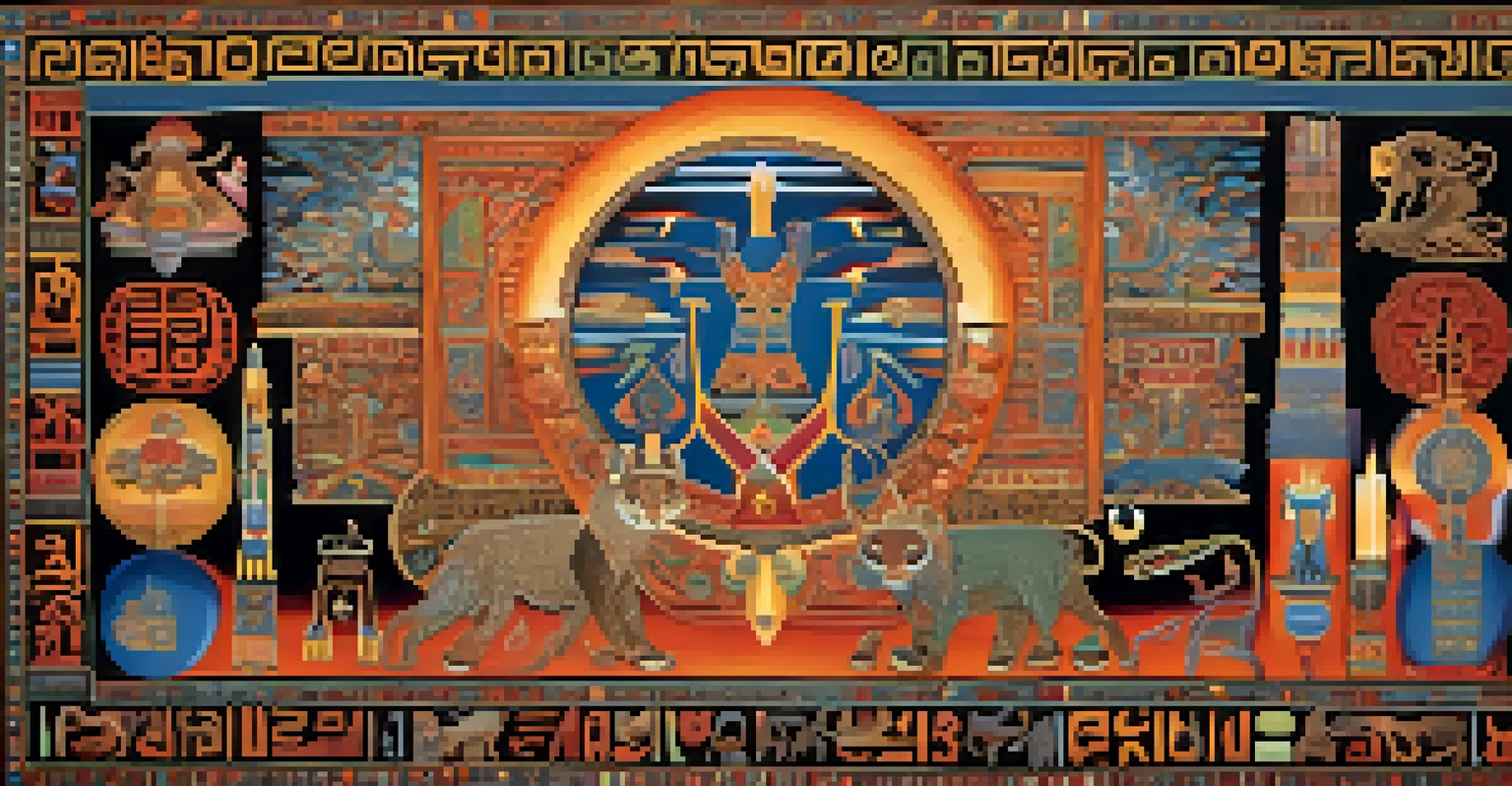Cultural Perspectives on Dreams and Their Spiritual Significance

The Universal Nature of Dreams Across Cultures
Dreams have fascinated humanity for centuries, transcending cultural boundaries. From ancient civilizations to modern societies, people have sought to understand the messages hidden within their dreams. This universal interest reflects a shared human experience, illustrating how dreams can connect us all, regardless of our backgrounds.
Dreams are the touchstones of our character.
In many cultures, dreams are seen as a bridge between the physical and spiritual worlds. For instance, Indigenous cultures often interpret dreams as guidance from ancestors or spirits. Such interpretations highlight the belief that dreams carry significant meanings beyond mere subconscious reflections.
As we explore these cultural perspectives, we begin to see how dreams serve not only as personal experiences but also as communal narratives that enrich cultural identities. This shared understanding invites us to appreciate the diverse ways in which dreams can influence our lives and beliefs.
Dreams in Ancient Civilizations: A Spiritual Lens
Ancient civilizations placed immense importance on dreams, often viewing them as prophetic messages. For example, in Ancient Egypt, dreams were considered divine communications, with dream interpreters playing crucial roles in society. This reverence for dreams showcases how deeply intertwined spirituality and dreaming were in shaping historical worldviews.

Similarly, the Greeks believed that dreams could provide insights into the future or reveal truths about oneself. The philosopher Aristotle even wrote about the significance of dreams, emphasizing their potential to convey valuable knowledge. Such perspectives illustrate how dreams were often regarded as vital tools for navigating life's complexities.
Dreams Connect Cultures Globally
Across various cultures, dreams serve as a shared human experience, illustrating their spiritual significance and communal narratives.
By examining these ancient beliefs, we gain insights into how past societies understood the interplay between the spiritual and the dream world. This historical context enriches our appreciation for the diverse meanings ascribed to dreams throughout human history.
Eastern Philosophies: Dreams as Pathways to Enlightenment
In Eastern philosophies, particularly within Buddhism and Hinduism, dreams are often viewed as opportunities for self-discovery and enlightenment. Dreaming is seen as a reflection of one's mind and can reveal hidden desires or fears. This perspective encourages individuals to engage with their dreams as a means of personal growth and spiritual awakening.
Dreams are not what you see in sleep; they are the things which do not let you sleep.
Meditation and mindfulness practices in these cultures often extend into the dream state, emphasizing the importance of awareness even during sleep. For instance, Tibetan Buddhism teaches that dreams can be harnessed for spiritual practices, allowing practitioners to explore their consciousness more deeply. This unique approach highlights the transformative potential of dreams.
As we delve into these Eastern perspectives, it becomes clear that dreams are not just random images but can serve as powerful tools for inner reflection and spiritual progress. This understanding invites us to explore our dreams with a more intentional mindset.
Indigenous Beliefs: Dreams as Messages from the Spirit World
Many Indigenous cultures around the world revere dreams as sacred messages from the spirit world. For them, dreaming is a communal experience, where the boundaries between the living and the spiritual blur. In these cultures, dreams can provide guidance, warnings, or even healing, emphasizing a profound connection to nature and the cosmos.
For example, the Ojibwe people of North America believe that dreams can reveal important truths and are often shared during community gatherings. Dream sharing becomes a way to strengthen bonds and foster understanding within the community. This practice underscores the significance of dreams as a collective experience.
Ancient Views on Dreams' Importance
Historically, civilizations like the Egyptians and Greeks revered dreams as divine messages or tools for personal insight.
By recognizing the spiritual significance of dreams in Indigenous cultures, we gain a deeper understanding of how these beliefs shape their worldviews. This perspective encourages us to honor and respect the diverse interpretations of dreams that exist across different cultures.
Dreams in Modern Psychology: Bridging Science and Spirituality
In contemporary psychology, dreams are often analyzed through various lenses, including the spiritual. While Sigmund Freud and Carl Jung laid the groundwork for understanding dreams as reflections of the unconscious, many modern psychologists also explore their spiritual dimensions. This integration of science and spirituality offers a holistic approach to interpreting dreams.
For instance, Jung’s concept of the collective unconscious highlights how shared symbols and archetypes can emerge in dreams, connecting individuals to a larger spiritual narrative. This idea resonates with spiritual beliefs that suggest dreams can tap into universal themes and insights. Through this lens, dreams become a source of wisdom that transcends individual experience.
As we navigate the intersection of psychology and spirituality, it becomes evident that dreams can hold both personal and collective significance. This dual perspective encourages us to explore our dreams not just as psychological phenomena but also as potential gateways to deeper spiritual understanding.
Cultural Practices Surrounding Dream Interpretation
Across various cultures, specific practices and rituals are dedicated to dream interpretation. For example, in many African communities, elders are often consulted for their wisdom in deciphering dreams, reinforcing the idea that dreams carry collective knowledge. This process not only validates the dreamer’s experience but also strengthens community ties.
In contrast, some cultures might use dream journals to document and reflect on dreams over time. Keeping a record of dreams allows individuals to identify patterns and gain insights into their lives, promoting personal development. This practice emphasizes the importance of intentionality in engaging with one's dreams.
Nightmares as Spiritual Messages
Nightmares are often interpreted as warnings or calls to address unresolved issues, highlighting their potential for personal growth.
By examining these cultural practices, we learn that the way we interact with our dreams can vary widely. These rituals and methods enrich our understanding of dreams, highlighting their role as valuable tools for personal and communal reflection.
The Spiritual Significance of Nightmares
While most discussions about dreams focus on pleasant experiences, nightmares also hold significant spiritual implications. Many cultures view nightmares as warnings or messages from the subconscious, urging individuals to confront unresolved issues. This perspective invites us to consider the importance of addressing our fears and anxieties.
For example, in some Indigenous cultures, nightmares may be interpreted as a call to seek balance and healing. Dreamers are encouraged to reflect on the underlying causes of their nightmares, fostering self-awareness and growth. This approach emphasizes the transformative potential of even the most distressing dreams.

Understanding nightmares as spiritual messages encourages us to approach them with curiosity rather than fear. By engaging with our nightmares, we can glean valuable insights that contribute to our overall spiritual journey.
Embracing Dreams as a Spiritual Practice
In a world that often prioritizes the tangible, embracing dreams as a spiritual practice can be incredibly enriching. By cultivating a deeper connection with our dreams, we open ourselves to insights that can guide our daily lives. This practice encourages mindfulness and reflection, fostering a sense of inner peace and clarity.
Many individuals find that incorporating dream work into their spiritual routines enhances their overall well-being. Techniques such as keeping a dream journal, sharing dreams with others, or engaging in meditation can deepen this connection. These practices allow us to honor our dreams as sacred experiences deserving of attention.
Ultimately, recognizing the spiritual significance of dreams invites us to explore the mysteries of our subconscious. By embracing dreams as a spiritual practice, we can embark on a journey of self-discovery and transformation, enriching our lives in profound ways.